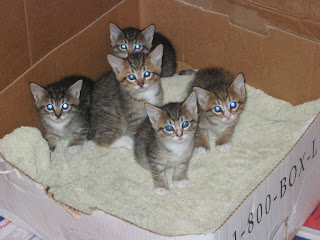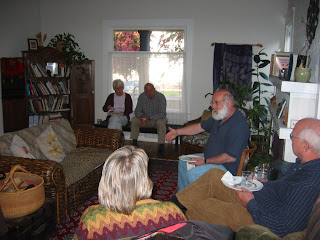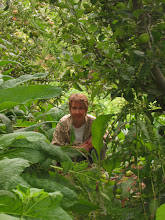More than a year in Corvallis: Our lives are good
When we arrived in Corvallis more than a year ago, it was a different world. It was pre-Ben. Now he's a fully mobile one-year-old, navigating himself through life quickly and with great agility. His zest for life and his laughter are contagious. When he's not completely exhausting us, he's energizing us. Courtney and I often say to each other, Ben's either making us younger or doing us in. Oh, well. I think all three generations feel lucky to have each other.
Ben's first birthday party was a grand success. Lots of Maya and Eder's friends came, and Eder's family came all the way from Monterey. It was beautiful warm weather in the early evening. Their backyard was full of lawn chairs, beer and bbq, family and friends. Ben was a gracious host--ripped open the presents with just a little help from his mom and Mimi (that's me!) But Aaron wasn't here, so we'll have another party, and another round of ice cream and cake with him.

The meeting of two formidable characters. Who will rule the roost?

And two handsome dudes. This set-up works for a certain amount of time, though not for long, because 25 lbs gets heavy pretty quickly. But Courtney is amazing in that he can get the dishes washed, laundry hung, mail brought in, gardens watered--and all the while Ben is safely contained.

I think they like each other.

Peeking around from behind Mimi's skirt.
So what else have we been up to besides Ben and kitties?
I continue to help with the monthly music benefits we call Second Saturdays. In May we had two bands, C2M and Free Range Chix, and funds raised went to the Oregon chapter of Military Families Speak Out. One of the mothers from MFSO, Adele, spoke for a few minutes about what the group does and how the monies would be spent. Then the rest of the evening I watched as people from the audience came up to her, each with their own story about a family member either in Iraq now or just back. The conversations were intense and personal and heartfelt. I could feel the emotions across the room.
After the benefit was over and we were cleaning up Adele and I began to talk. She told me some days all she can do is cry--just from the weight and sorrow and suffering that she is part of--because she listens to families' stories all the time. I couldn't sleep that night, and just laid in bed, wiped out from just the little bit I heard and felt during the evening. I can't imagine what it would be like to have a child of mine in a war zone, and not know from day to day if they were going to survive, or how that survival was going to look.
In June we had a solo guitarist named Rhino Madness and then a student band called Critical Mass. The beneficiary was the Corvallis Counter-Recruitment Committee. It was a different kind of evening than the other Second Saturdays, much more rowdy, and with people dancing. Everyone said they had lots of fun. I just helped with set-up and then left to spend the evening with Courtney, because he was leaving for Morro Bay the next morning. His dad was scheduled to have surgery, and Courtney was going to be with him while he was recovering. But, as it turned out, his dad had a cold and the surgery was postponed. The purpose of the trip shifted, and Courtney just got to spend a few days with his dad, and then home he came. Hooray! The kitties and I survived, but just barely.
Also I've been working in the deli at the Co-op, First Alternative, first as an owner-worker, so just two hour per week support shifts. But more recently I've moved up the ladder to a paid-sub position. So I can take shifts that they offer me or turn them down, according to what else I've got going on. Ideally I'll work a couple shifts per week and take care of Ben 2-3 days a week.
The Co-op is in its 37th year. I think it may be the oldest co-op in the country, or at least one of the oldest. There's two locations--the larger and original South Store and the smaller, neighborhood North Store. Between the two stores, there's 115 employees, 64 owner-workers, a volunteer board of directors, and over 6,000 owners.
At first I couldn't figure out why it was so different working in the Co-op deli than other jobs I've had. It seemed amazing to me how self-directed everyone I worked with seemed. No manager telling the employees what to do. Everyone took responsibility for whatever they saw needed to be done. It finally dawned on me that the employees are also owners. Duhhhhhhh, that's why they all act like it's their own business--it is.
I think that all ties in with the following quote I saved from an online article, by Frances Fox Piven, titled Time for Progressives to Grow Up: "We've lived so long under the spell of hierarchy..... that only recently have we awakened to see not only that 'regular' citizens have the capacity for self-governance, but that without their engagement our huge global crisis cannot be addressed. The changes needed for human society simply to survive, let alone thrive, are so profound that the only way we will move toward them is if we ourselves, regular citizens, feel meaningful ownership of solutions through direct engagement. Our problems are too big, interrelated, and pervasive to yield to directives from on high."
And speaking of big problems, June 10th marked the fortieth anniversary of the Israelis occupation of the Palestinian Territories. If you'd take a moment to think about what the last 40 years of your life would have been like --living under military occupation, without freedom of movement, often time under curfew for days at a time, probably unemployed or unable to reach your employment, probably unable to reach your school. Thanks for taking the time to ponder that. The Palestinians have had lots of time to ponder how their lives might have been different...but aren't.
On a lighter note, I can't remember where I found this quote, but I love it: "I get up every morning determined both to change the world and to have one hell of a good time. Sometimes this makes planning the day difficult." --E. B. White (1899-1985)
And this one, borrowed from my dear sister's blog, http://doojies.blogspot.com/, by Maya Angelou:
"I did what I could. When I knew better, I did better."
May we all grow to know better, and to do better. Thanks, as always, for reading our blog. I have had a hard time keeping up with making regular entries, but am vowing to write one or two each month. But meanwhile, Courtney has started his own, so please check it out at
http://surfingthewillamette.blogspot.com/.
Good luck to us all,
Valori








